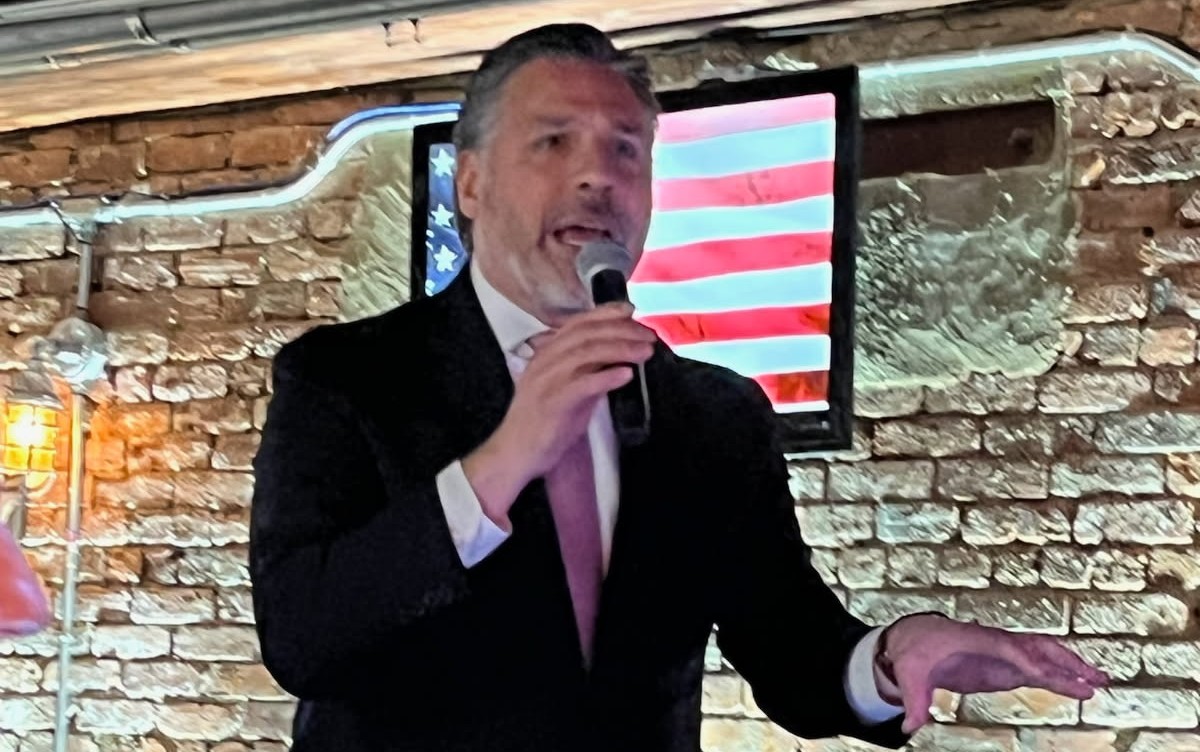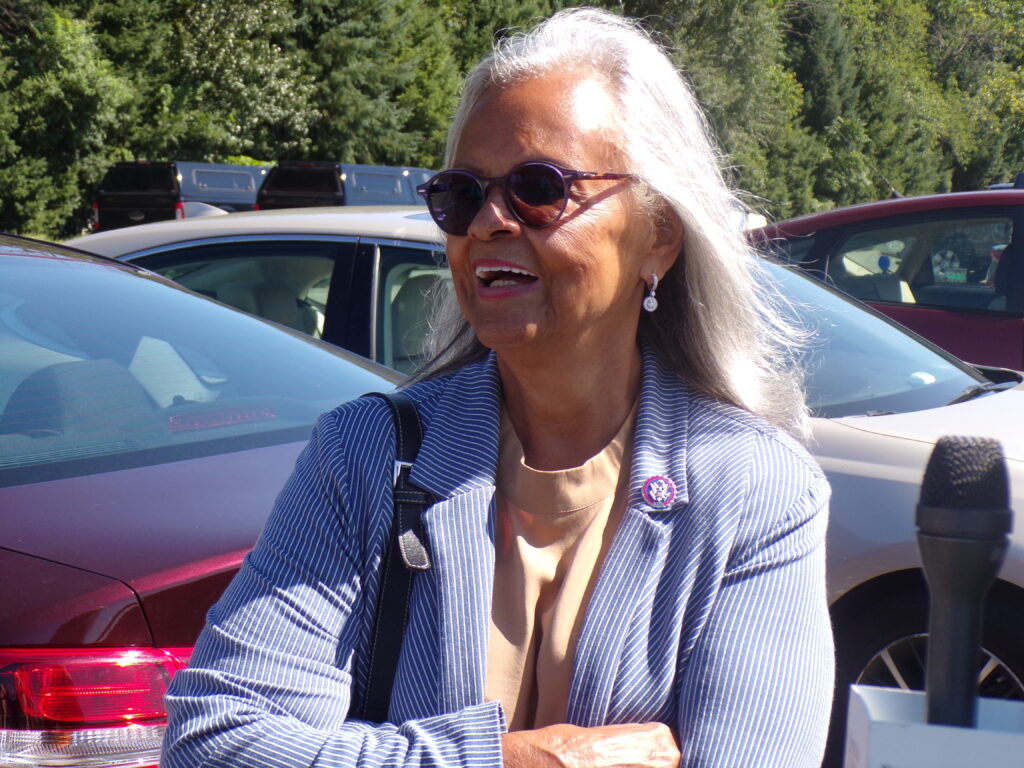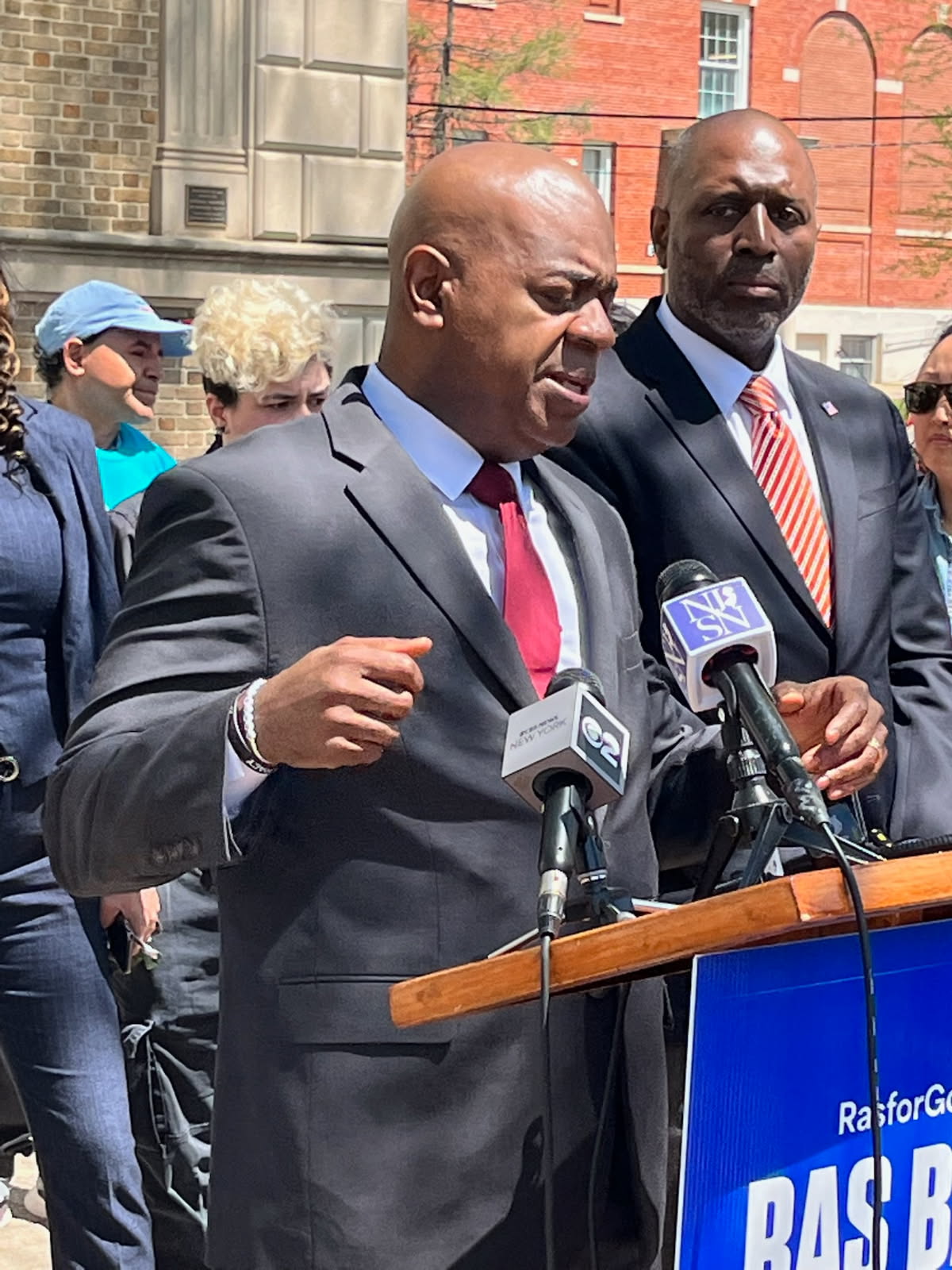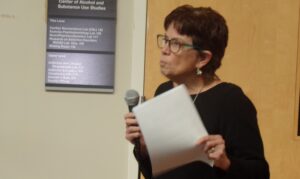
NEW BRUNSWICK – Reeling but committed to solidarity from the labs to the streets and ready for a long, tough fight, Rutgers University scientists, educators and staff this afternoon called attention to the ravaging, destabilizing impact of Trump administration funding cuts, freezes, and policy changes on life-saving medical research and public higher education.
Dispatching billionaire Elon Musk to overhaul government, President Donald Trump has undertaken an anti-science crusade resulting in the freezing of federal grants, sweeping layoffs across federal agencies, and funding cuts for biomedical research.
Dr. Monica Driscoll, a molecular biologist and biochemist who specializes in neuro-degenerative disease research, said “I love the way us has done science – at least in the past.”
But now, “I am stunned and devastated by this government-mediated dismantling of an incredibly successful scientific enterprise,” she said, in a packed general-purpose room in the Life Sciences Building on the Busch Campus.
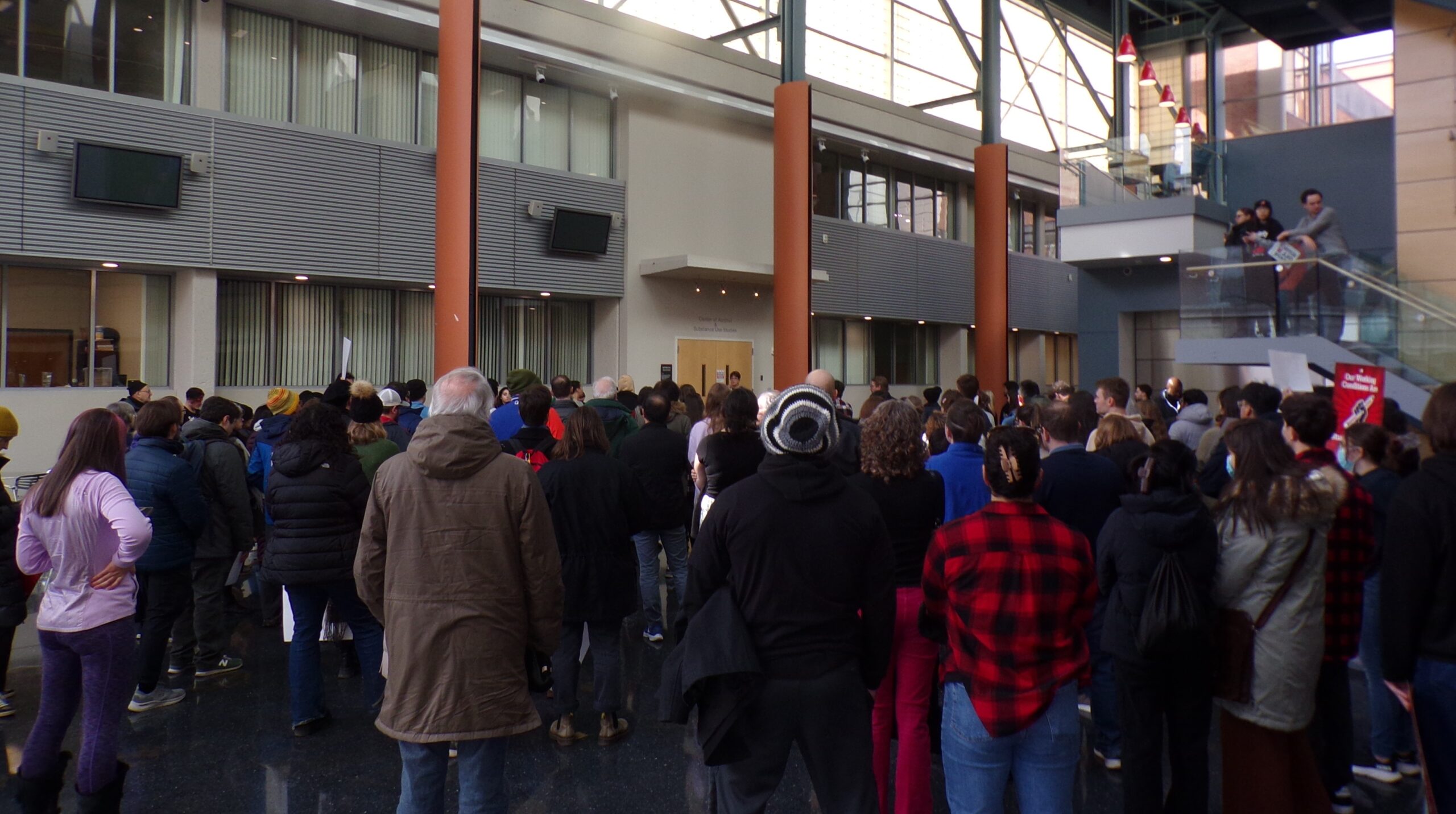
Driscoll said she just received a letter from the American Cancer Society noting the drop by 34% in cancer deaths between 1991 and 2022, and estimated 4.5 million saved, owing to breakthroughs in scientific research.
“The U.S. is a crown jewel of research,” she said. “Many have come to participate, from all over the world. This is not a money drain. For every tax dollar that is invested, two dollars and 46 cents are returned on that investment.”
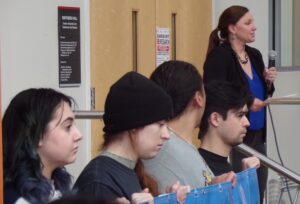 Trump’s cuts will indirectly impact costs everywhere, including electricity, water, police support systems and grants for safety. “It makes absolutely no sense to claim you’re making cuts for efficiency,” Driscoll said. “The consequence of this will be a complete waste of money.”
Trump’s cuts will indirectly impact costs everywhere, including electricity, water, police support systems and grants for safety. “It makes absolutely no sense to claim you’re making cuts for efficiency,” Driscoll said. “The consequence of this will be a complete waste of money.”
Cancer research. Pandemic research. Public health in this country, not to mention the kayoing of hundreds of thousands of jobs – these are the targets. Said Molecular biologist Elizabeth Darrimo, “The truth is, the richest man in the country should not be the one to decide how federal funding gets cut.”
Unions representing more than 10,000 educators, researchers, clinicians, and others sponsored the “Hands of our Research” actions at Rutgers New Brunswick and Newark in concert with educators nationwide.
“Every day, the Trump administration is announcing new attacks that will disrupt and ultimately wreck the public higher education system that we and our colleagues around the country have worked to build over many decades,” said Todd Wolfson, national president of the American Association of University Professors (AAUP) and president of Rutgers AAUP-AFT.
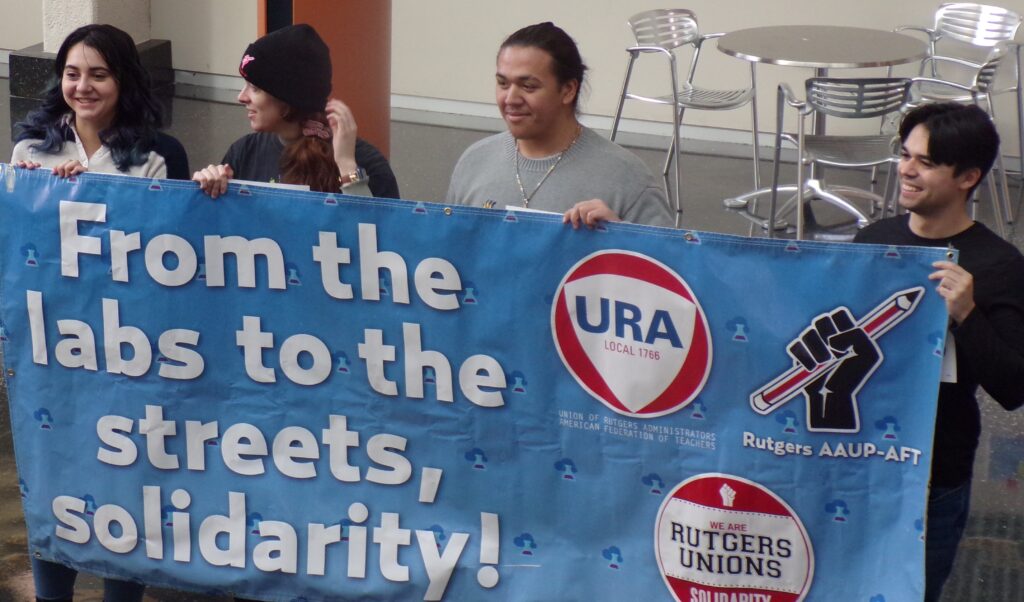
“The public needs to know that this will have a devastating impact far beyond our campuses—in red states and blue states alike,” Wolfson added. “Life-saving medical research is being strangled. Accepted facts in science and any number of the other fields we teach are being called into question. And the Republican witch-hunt against DEI policies will lead to resegregation on our campuses and in our society if it isn’t stopped.”
At Rutgers, scientists overseeing critical research projects are facing new uncertainties every day about whether their work can continue.
“Research scientists also teach undergraduates and graduate students, both in the classroom and with critical hands-on work in their research labs,” said Tara Matise, a distinguished professor and chair of the Genetics department at Rutgers. “Our ability to remain a top school in the biomedical sciences is now at great risk. We also hire postdoctoral fellows and lab technicians. If NIH funding is cut, labs will have to downsize, and some will close, creating a sudden and large group of unemployed scientists.”
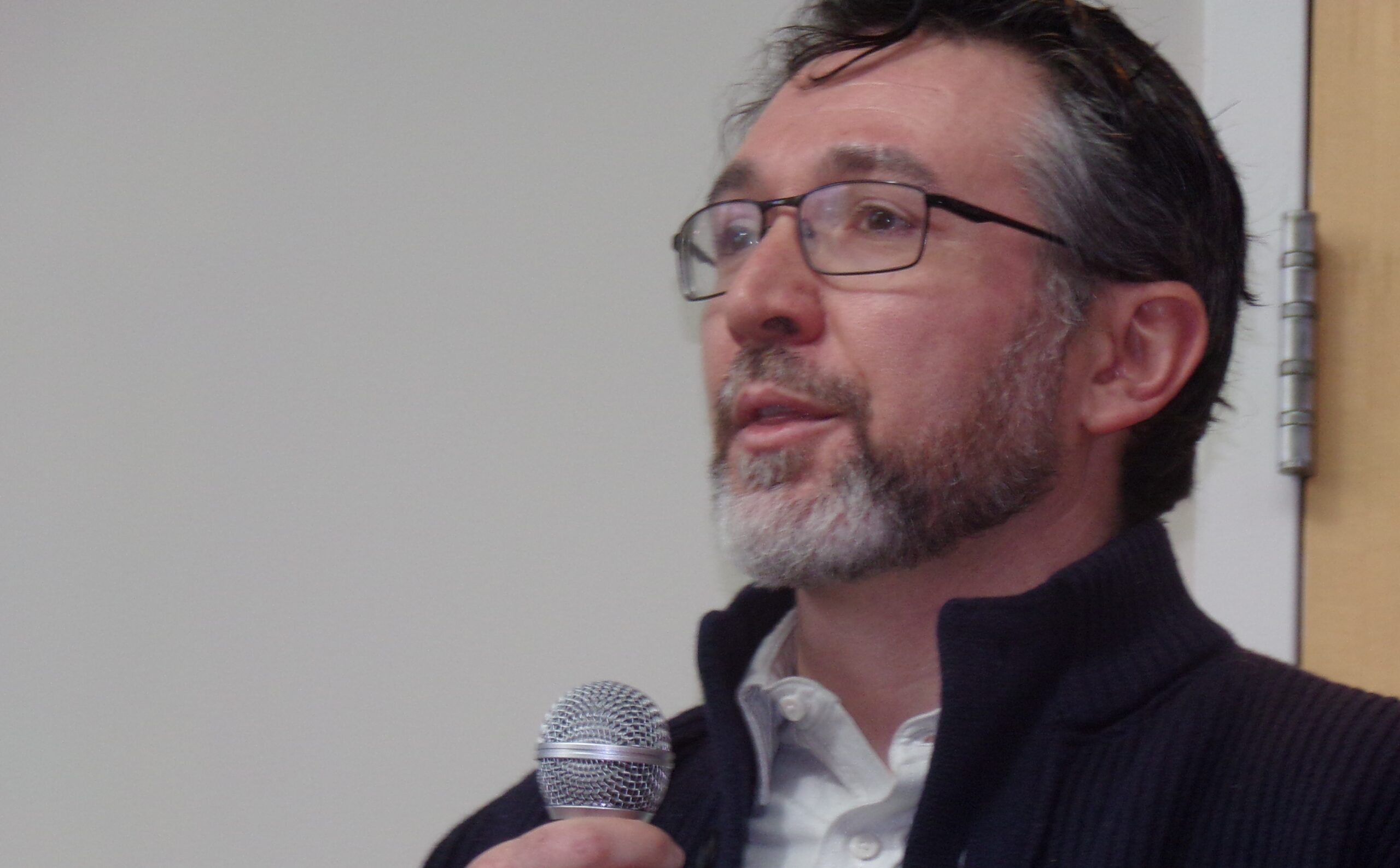
Matthew Buckley, an associate professor of Physics and Astronomy, said, “However people voted in 2024, I don’t think anyone was voting to cut funding for cancer research—but that’s exactly what’s happening right now. US investment in basic science has given us medicines that save children’s lives. It gave us the technologies we use to grow our food, get to work, and even enjoy our free time. Grants from the National Institutes of Health and other agencies train the next generation of medical doctors and scientists. The unprecedented freezes and cuts to grants ultimately threaten our health care and our economy.”
2024, I don’t think anyone was voting to cut funding for cancer research—but that’s exactly what’s happening right now. US investment in basic science has given us medicines that save children’s lives. It gave us the technologies we use to grow our food, get to work, and even enjoy our free time. Grants from the National Institutes of Health and other agencies train the next generation of medical doctors and scientists. The unprecedented freezes and cuts to grants ultimately threaten our health care and our economy.”
The unions that organized the Rutgers speak-outs are Rutgers AAUP-AFT, which represents more than 6,000 full-time faculty, graduate workers, postdoctoral associates, and counselors; the Rutgers Adjunct Faculty Union, which represents some 2,800 adjunct lecturers; and AAUP-BHSNJ, which represents 1,400 biomedical faculty in Rutgers Biomedical and Health Sciences facilities throughout the state.
“This is going to be a tough fight but it’s a fight we can win,” said Buckley.

Researcher Andres Morena told the crowd here that the scientists’ fight “is intertwined with that of others.”
others.”
“What is going on is disturbingly similar to the events preceding the collapse of democracies in other countries,” he said. “We cannot just be focused on our benchwork and grant writing.”
Trump specializes in “scapegoating vulnerable populations.”
“The threat to our research was a long time coming,” Morena said. “What we are experiencing is an extension of a broader fascistic attack. The more this this institution dies the easier it is for authoritarians to destroy our democracy. We need to be fighting alongside others, and they will be fighting alongside us.”
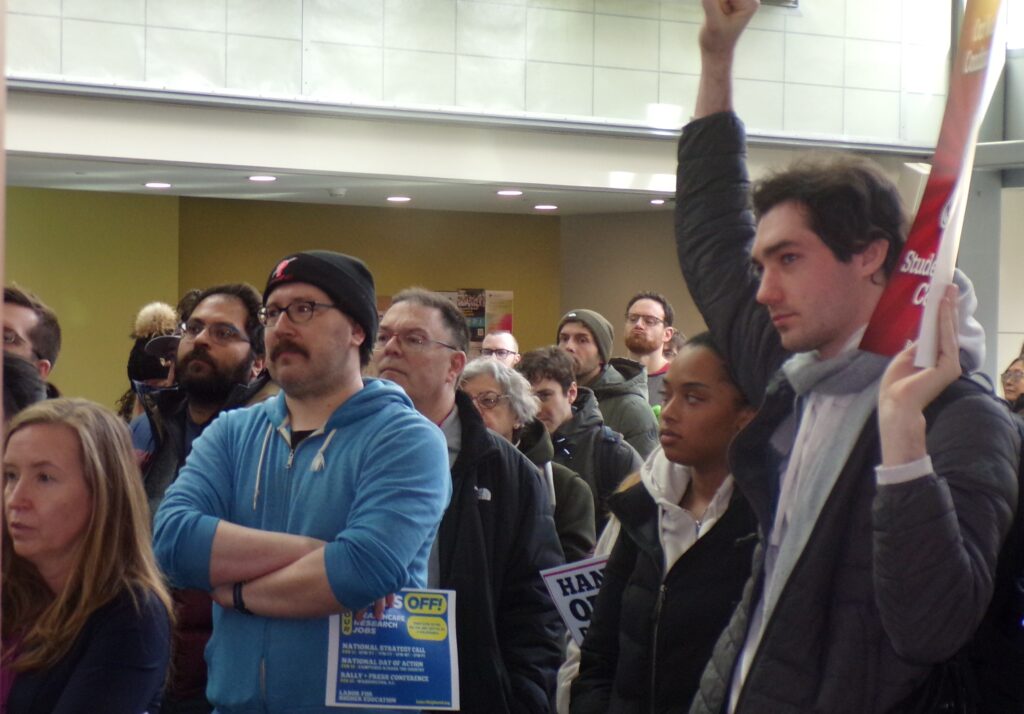
(Visited 69 times, 69 visits today)
Rutgers University Scientists Oppose Budget Cuts Proposed by Trump Administration
Rutgers University scientists are speaking out against the budget cuts proposed by the Trump administration, which they say could have devastating effects on research and innovation at the university.
The proposed cuts, which are part of President Trump’s budget plan for the upcoming fiscal year, would slash funding for scientific research and education programs at Rutgers University. This includes cuts to programs that support graduate student research, as well as funding for important research projects in areas such as climate change, public health, and technology.
Scientists at Rutgers University are warning that these cuts could have far-reaching consequences for the university’s ability to conduct cutting-edge research and attract top talent. They argue that the proposed cuts would not only hinder scientific progress at Rutgers, but also have negative implications for the state of New Jersey and the country as a whole.
In a statement released by Rutgers University, scientists expressed their concerns about the proposed budget cuts, stating that they would “jeopardize the future of scientific research and innovation at our university.” They emphasized the importance of federal funding for research and education, and urged lawmakers to reconsider the proposed cuts.
The scientists also highlighted the significant contributions that Rutgers University has made to scientific discovery and technological advancement in recent years. They pointed to groundbreaking research in areas such as renewable energy, biotechnology, and environmental science, which have had a positive impact on society and the economy.
In addition to opposing the budget cuts, scientists at Rutgers University are calling for increased investment in scientific research and education. They argue that funding for these programs is essential for maintaining America’s leadership in science and technology, and for addressing pressing challenges such as climate change, healthcare, and national security.
As the debate over the budget cuts continues, scientists at Rutgers University are hopeful that their voices will be heard and that lawmakers will prioritize funding for scientific research and education. They believe that investing in these programs is crucial for ensuring a bright future for Rutgers University and for advancing knowledge and innovation in the United States.

